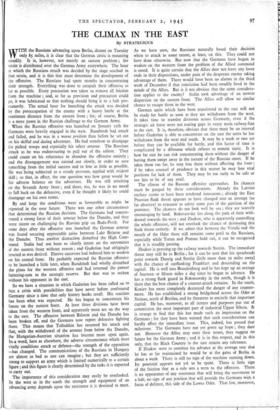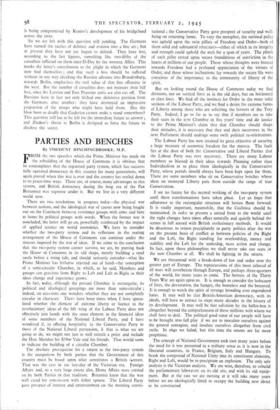THE CLIMAX IN THE EAST
By STRATEGICUS
WITH the Russians advancing upon Berlin, distant on Tuesday only 85 miles, it is clear that the German crisis is mounting steadily. It is, however, not merely an eastern problem ; the
strain is distributed over the German Army everywhere. The hour at which the Russians struck was decided by the stage reached in that strain, and it is this that must determine the development of the offensive. The Russians had spent months in concentrating their strength. Everything was done to catapult their offensive as far as possible. Every precaution was taken to remove all friction from the machine ; and, as far as prevision and precaution could go, it was lubricated so that nothing should bring it to a halt pre- maturely. The actual hour for launching the attack was decided by the preoccupation of the enemy with a heavy battle at the maximum distance from the eastern front ; for, of course, Berlin is a mere pawn in the Russian challenge to the German Army.
When the Russian offensive was launched on January t2th the Germans were heavily engaged in the west. Rundstedt had struck and failed, and he was in a worse position than before he set out on his skilful and daring adventure. He had somehow to disengage his picked troops and especially his select armour. The Russians struck as he was endeavouring to pull out of the salient. They could count on his reluctance to abandon the offensive entirely ; and the disengagement was carried out slowly, in order to save something from the initial success and to lose as little as possible. He was being subjected to a steady pressure, applied with evident skill ; so that, in effect, the one question was how great would be his adverse balance on the adventure. He was still attacking on the Seventh Army front ; and there, too, he was in no moot! to fall back on the defensive, even if he thought it likely he could disengage on his own terms.
By and large the conditions were as favourable as might be expected in the near future. There was one other circumstance that determined the Russian decision. The Germans had concen- trated a strong force of their armour below the Danube, and they were intent on challenging the Russian grip on Buda-Pestb. For some days after the offensive was launched the German armour was found securing appreciable gains between Lake Balaton and the Danube. Thus another distraction disturbed the High Com- mand. Stalin had not been so clearly intent on the extremities of the eastern front without reason ; and Guderian had obligingly reacted as was desired. Elusive successes had induced him to weaken on his central front. He probably expected the Russian offensive to be launched a little later, when Rundstedt had wholly disturbed the plans for the western offensive and 111.-d returned the panzer battering-ram to the strategic reserve. But that was to reckon without his opponent in the east.
So we have a situation in which Guderian has been called on to face a crisis with possibilities that have never before confronted Germany since a time that only history books recall. His reaction has been what was expected. He has begun to concentrate his forces on the eastern front. At least three divisions have been taken from the western front, and apparently more are on the way to the east. The offensive between Balaton and the Danube has been broken off, and the Germans now report defensive fighting there. This means that Tolbukhin has resumed his attack and that, with the withdrawal of the armour from below the Danube, the Hungarian-Austrian situation has become more open again. Ina word, here as elsewhere, the adverse circumstance which most vitally conditions attack or defence—the strength of the opposition —has changed. The communications of the Russians in Hungary are almost as bad as one can imagine ; but they are sufficiently strong to support an army which is limited numerically to a certain figure ; and this figure is clearly determined by the tasks it is expected to carry out
The importance of this consideration may easily be overlooked. In the west as in the south the strength and equipment of an advancing army depends upon the resistance it is destined to meet. As we have seen, the Russians naturally based their decision when to attack to some extent, at least, on this. They could not have done otherwise. But now that the Germans have begun to weaken on the western front the problem of the Allied command is eased. It is quite certain that the Allies dare not leave any loose ends in their dispositions, under pain of the desperate enemy taking advantage of them. There would have been no alarms in the third week of December if that conviction had been steadily fixed in the minds of the Allies. But is it not obvious that the same considera- tion applies to the enemy? Stalin took advantage of an unwise dispersion on the eastern front. The Allies will allow no similar chance to escape them in the west.
German units which have been transferred to the east will not be ready for battle as soon as they are withdrawn from the west.
It takes time to transfer divisions across Germany, even if the strategic air force were not tearing gaps in every main railway-line to the east. It is, therefore, obvious that there must be an interval before Guderian is able to concentrate on the east the units he has withdrawn from the west and south. It may be a week or two yet before they can be available for battle, and this factor of time is complicated by a dilemma which refuses to remain static. It is how far east he can risk concentrating them without the danger of having them swept away in the torrent of the Russian onset. If he takes them too far, he may lose them without affecting the issue ; if he takes counsel of prudence in this matter he may lose vital positions for lack of them. They may be too early to be safe or too late to be of any avail.
The climax of the Russian offensive approaches. Its chances must be gauged by these considerations. Already the Latvian enclave seems to have been rendered innocuous ; already the East Prussian flank threat appears to have changed into an attempt (so far abortive) to evacuate to safety some part of the garrison of the province. The chances do not look well by sea ; they are scarcely encouraging by land. Rokossovsky lies along the path of their with- drawal towards the west ; and Zhukov, who is apparently controlling the whole offensive, will not overlook the chance of destroying this flank threat entirely. If we admit that between the Vistula and the mouth of the Oder there still remains some peril to the Russians, especially while Torun and Poznan hold out, it can be recognised that it is steadily passing.
Zhukov is pressing up the railway towards Stettin. The immediate threat may still be to Berlin ; for it can be seen that his spearheads point towards Danzig and Stettin (little more than 5o miles away) with the chance of outflanking Frankfurt and descending on the capital. He is well into Brandenburg and he has kept up an average of fourteen or fifteen miles a day since he began to advance. He has a strong flank guard in Rokossovsky in the north, though it is there that the best chance of a counter-attack remains. In the south, Koniev has more completely destroyed the danger of any counter- move. He has established a strong bridgehead across the Oder at Steinau, north of Breslau, and he threatens to encircle that important capital. He has, moreover, to all intents and purposes put out of commission the most important part of industrial Upper Silesia. It is strange to find that this has made such an impression on the Germans ; for they have been warned that such considerations can hardly affect the immediate issue. This, indeed, has passed that milestone. The Germans have not yet given up hope ; they dare not. However the Allies may state their terms, they suggest no future for the German Army ; and it is in this respect, and in this only, that the Black Country in the east retains any relevance.
If Zhukov were to continue his advance at the average rate that he has so far maintained he would be at the gates of Berlin in about a week. There is still no sign of the machine running down. Its potential appears not yet to be spent. There is little sign of the friction that as a rule sets a term to the offensive. There is no appearance of any resistance that will bring the movement to a halt, no sign of any position that will provide the Germans with a focus of defence, this side of the Lower Oder. That line, moreover,
is being compromised by Koniev's development of his bridgehead across the river.
So we are left with this question still pending. The Germans have turned the tactics of defence and evasion into a fine art ; but at present they have not yet begun to defend. They have lost, according to the last figures, something like two-fifths of the casualties inflicted on them since D-Day by the western Allies. This marks the latter's contribution to the plight in which the Germans now find themselves ; and that such a loss should be suffered without in any way checking the Russian advance into Brandenburg, towards Berlin, emphasises the real value of that fine offensive in the west. But the number of casualties does not measure their full loss, since the Latvian and East Prussian units ate also cut off. The Russians have in fact not only filched one defensive position from the Germans after another: they have destroyed an impressive proportion of the troops who might have held them. Has the blow been so deadly that Guderian cannot make a stand somewhere? This question still has to be left for the immediate future to answer ; and Zhukov's threat to Berlin is designed to force the future to disclose the secret.



























 Previous page
Previous page